Paul Mazursky's Bob & Carol & Ted & Alice is a devilishly funny but wickedly thoughtful and contemplative film that shows a time period in America when what happened in the bedroom between a man and a woman didn't stay in the bedroom between a man and a woman. The newer generation taught us to be more open and thoughtful with our sexual desires, expressing them freely, and not restricting them as if sex was an unnatural thing. Connecting this to film, as I so often do, just look at how Americans have quietly been told to fear sex. A violent wartime epic can still achieve a PG-13 rating, while a three second shot of a vagina will stamp you film with the "kiss of death" NC-17 rating. How have our private parts been so private we've resorted to embracing the unnatural and the cruel and fearing the natural and the serene? Bob & Carol & Ted & Alice was made in 1969, right on the teetering edge of the hippie movement and during the "free love" movement, where marriage was seen as a restraint on ones well-being and pocketbook and the state had no business in dealing with it. The film, judging by its premise, deals with the concept of swinging or "wife-swapping," when it in turn, deals with the ethics and moral values that get in the way of doing such acts. We explore the lives of two couples, ostensibly similar on the surface, but royally different when examined. The couples are Bob and Carol Sanders (Robert Culp and Natalie Wood), a trendier, more liberal couple, while Ted and Alice Henderson (Elliott Gould and Dyan Cannon) are your more straight-shooting, square couple, highly indicative of the parents of sexually promiscuous teens in the 1960's and 1970's trying to understand their teenage sons and daughters.
Bob and Carol spend a weekend at a couples retreat, one of those camps that allows for emotional honesty between married people to flow and allow for deeper feelings and emotions to penetrate one another. Because of the impact this has had on them, Bob reveals to Carol that while working on a film set he slept with another woman in an act he called "purely physical" and not emotional. Carol accepts this about as well as a wife could, believing Bob, admiring his honesty, and carrying on her own way, even casually revealing it to their best friends Ted and Alice, who are appalled at the thought. Alice finds herself especially sick with the idea that Bob could do such a thing and then reveal it to Carol who isn't the least bit upset with him. Damn western hippies, I tell you.
This prompts Ted and Alice to have a lengthy nighttime conversation about the affair, the impact it could have on their friends in the long term, and if they themselves are sexually promiscuous at all. This is one of the many great talks in the film, focusing sharply on human emotion and feelings, two things often traded in American cinema for punchlines and vulgarity. In this conversation, Mazursky leaves the camera turned on the couple for a long period of time, listening to the conversation, hearing what both has to say, and leaving us with a lot to contemplate by the end of talk, whether we're single or married.
These kinds of dialogs that go on for a while and leave the view in a self-contemplative state are fiercely common in Bob & Carol & Ted & Alice, including the nudging idea of "is it possible for a couple to be married for a lifetime and not have sexual feelings for another women, be them expressed or regressed?" Throughout his career, Mazursky has been interested in character, marriages, the arguments and debates that a husband and wife have, but most importantly, relationships. When I say "relationships," I don't mean those confined to a marital or dating relationship but various relationships people can find themselves in.
The actors here couldn't have been more perfect for their roles. We have the unbelievably gorgeous and beautifully mannered Natalie Wood in a role that requires impeccable conviction and plausibility, given the tender nature, Robert Culp in an equally uncomfortable but rewarding role, with Elliott Gould and Dyan Cannon assuming the role of the uppity parents trying to comprehend this "sexual openness" these couples speak of. All of these actors, equipped with Mazursky's and co-writer Larry Tucker's biting dialog, help illustrate the generation gap where sex is a revered act that should be kept on the down-low or sex is an act embraced and discussed.
With Bob & Carol & Ted & Alice, Mazursky and Tucker ask the biggest questions I've seen them ask yet. Is free love something to embrace or condemn? Is swinging, wife-swapping, or an orgy lethal to a marriage and its long-term prosperity in health? Is it healthy in itself to casually dismiss an affair or harp on it and risk losing the one you love? To show that these questions are still very much alive and the idea of sexual openness is still one discussed today, the modern-day film equivalent to Bob & Carol & Ted & Alice is Joe Swanberg's Drinking Buddies, a film that clearly is influenced by Mazursky's film right down to its poster. Both films explore the aforementioned ideas, only one takes a much younger cast and puts them to use while the other takes couples grappling with an older age and simply trying to fit in. Both films are two of my favorite romantic comedies to boot, as well.
Bob and Carol spend a weekend at a couples retreat, one of those camps that allows for emotional honesty between married people to flow and allow for deeper feelings and emotions to penetrate one another. Because of the impact this has had on them, Bob reveals to Carol that while working on a film set he slept with another woman in an act he called "purely physical" and not emotional. Carol accepts this about as well as a wife could, believing Bob, admiring his honesty, and carrying on her own way, even casually revealing it to their best friends Ted and Alice, who are appalled at the thought. Alice finds herself especially sick with the idea that Bob could do such a thing and then reveal it to Carol who isn't the least bit upset with him. Damn western hippies, I tell you.
This prompts Ted and Alice to have a lengthy nighttime conversation about the affair, the impact it could have on their friends in the long term, and if they themselves are sexually promiscuous at all. This is one of the many great talks in the film, focusing sharply on human emotion and feelings, two things often traded in American cinema for punchlines and vulgarity. In this conversation, Mazursky leaves the camera turned on the couple for a long period of time, listening to the conversation, hearing what both has to say, and leaving us with a lot to contemplate by the end of talk, whether we're single or married.
These kinds of dialogs that go on for a while and leave the view in a self-contemplative state are fiercely common in Bob & Carol & Ted & Alice, including the nudging idea of "is it possible for a couple to be married for a lifetime and not have sexual feelings for another women, be them expressed or regressed?" Throughout his career, Mazursky has been interested in character, marriages, the arguments and debates that a husband and wife have, but most importantly, relationships. When I say "relationships," I don't mean those confined to a marital or dating relationship but various relationships people can find themselves in.
The actors here couldn't have been more perfect for their roles. We have the unbelievably gorgeous and beautifully mannered Natalie Wood in a role that requires impeccable conviction and plausibility, given the tender nature, Robert Culp in an equally uncomfortable but rewarding role, with Elliott Gould and Dyan Cannon assuming the role of the uppity parents trying to comprehend this "sexual openness" these couples speak of. All of these actors, equipped with Mazursky's and co-writer Larry Tucker's biting dialog, help illustrate the generation gap where sex is a revered act that should be kept on the down-low or sex is an act embraced and discussed.
With Bob & Carol & Ted & Alice, Mazursky and Tucker ask the biggest questions I've seen them ask yet. Is free love something to embrace or condemn? Is swinging, wife-swapping, or an orgy lethal to a marriage and its long-term prosperity in health? Is it healthy in itself to casually dismiss an affair or harp on it and risk losing the one you love? To show that these questions are still very much alive and the idea of sexual openness is still one discussed today, the modern-day film equivalent to Bob & Carol & Ted & Alice is Joe Swanberg's Drinking Buddies, a film that clearly is influenced by Mazursky's film right down to its poster. Both films explore the aforementioned ideas, only one takes a much younger cast and puts them to use while the other takes couples grappling with an older age and simply trying to fit in. Both films are two of my favorite romantic comedies to boot, as well.
OOOOOOOOOOOOOOOOOOOOOOOOOOOOOOOOOOOOOOOOOOOOOOOOOOOOOOO
INSIGHT! INSIGHT!
I love this movie. Although some people may classify it as "dated," the concepts that it deals with are worth exploring today. How honest are we to one another? How often do we actually look at people? And what is love?
From its opening shots (tooling up PCH in a cool car) to its closing ones (people really looking at each other), it's a true work of art. The beginning truly captures the free and concept-expanding atmosphere that is the Esalen Institute, which itself has not changed much since then. Screen goddess Natalie Wood, in one of her best roles, inhabits the honesty and sexual freedom that is Carol. Robert Culp is a strong counterpart to her as Bob. The more repressed couple, Eliott Gould and Dyan Cannon, are perfect.
Along the way, they explore the boundaries of sexuality, monogamy and friendship, and realize that some lines are better left uncrossed. To me, it puts a very fine point on what was going on in the 60s, and where exactly we went wrong.
SEE THIS FILM. It'll give you insight. Promise.
OOOOOOOOOOOOOOOOOOOOOOOOOOOOOOOOOOOOOOOOOOOOOOOOOOOOOOO
Clever & Cool & Classy & Funny
What a delightful movie! I don't think its aged one bit. Sure the clothes are different, the latest self-help fads are different, the priorities are different--but SO much still resonates today. The relationship between love and sex and spouses and friends. Human desire, and commitment are timeless topics, and they are explored with great wit and panache in this thoroughly entertaining movie. And the dialogue! Many scenes purely consist of the twists and turns of intelligent people in verbal games--some of the scenes feel like being in a verbal
amusement park, going up and down roller-coasters of clever and surprising
dialogue. The funny moments are priceless: the tennis instructor asking for a glass of Pernod, Dyan Cannon in the therepist's office--probably the funniest and most perceptive take on the "therepy experience" ever shown on film-- (along with Kirstie Alley's therapist melt-down scene in Woody Allen's
"Deconstructing Harry"), the opening group therapy session in the beautiful
California countryside, that first dinner in the restaurant with Bob and Carol and Ted and Alice all declaring their love for each other in front of the table of bemused gay diners--it is a film filled with endless, perceptive and highly
amusing details. Its a terrific entertainment. (One last comment--Dyan Cannon lights up the screen everytime she appears, with her sexy persona, her high
spirits, her warmth and generosity, and that truly infectious laugh!)
OOOOOOOOOOOOOOOOOOOOOOOOOOOOOOOOOOOOOOOOOOOOOOOOOOOOOOO
Still worth watching.
B&C&T&A is still entertaining and has a number of funny scenes. Two of my favorites are the opening scene at the Esalen Institute, and Alice's session with her psychiatrist. The cast,particularly Dyan Cannon (Best Supporting Actress- NY Film Critics)and Elliot Gould, is perfect. B&C&T&A really do seem like couples and friends. It's Natalie Wood's best adult film role, and arguably her best film performance:she's never been more natural or at ease in front of the camera. Robert Culp never had a better role or vehicle. The film marked Mazursky's directorial debut, and it's probably his best film. The final scene in front of the Riviera Hotel in Vegas, recalls the "looking" exercise at the Institute, and was influenced by the parade at end of Felini's "81/2". Therefore, I give the film an 81/2 out of 10. Rent(or buy) the DVD and listen to the commentary with Cannon,Culp,Gould and Mazursky. Did you know that Leif Garrett plays Bob and Carol's son, and that Culp's "I Spy" costar, Bill Cosby, appears briefly(don't blink) in a scene at a club? The film has aged better than Midnight Cowboy, Z, Butch Cassidy, Hello Dolly and Anne of the Thousand Days,the films nominated for Best Picture of 1969. B&C&T&A feels more representative of the 60's than The Graduate, and is definitely worth seeing.
OOOOOOOOOOOOOOOOOOOOOOOOOOOOOOOOOOOOOOOOOOOOOOOOOOOOOOO
Great 60's comedy w/beautiful actresses
One of the best of 1969 with Natalie Wood and Dyan Cannon at their sexiest. Perfect casting, great story, and Mazursky's best film. I know the critics were split on this one, but it came out at the right time and it holds up today. What's not to like about this? Elliott Gould was never more befuddled, Dyan Cannon's best acting when she was gorgeous, Robert Culp's only decent movie, and Natalie Wood was born to play Carol.
Certainly a 9 out 10! Mazursky would never again be so in touch with the times and the ending is NOT a cop-out! Check this out. Great stuff! Even the encounter session scenes have the ring of truth for that sort of thing. This movie is great!
0000000000000000000000000000000000000000000000000000000000000000000000000000000
review of Bob&Carol&Ted&Alice
keeping in mind how long this movie has survived and to find that its continuing popularity seemingly intact. it was (and remains) a brisk paced "fun, and funny" movie that still holds up in this somewhat jaded time we now live in - most viewers today would not have a clue how racy this movie was thought to be at its first showing way back in 1969. I can still remember my wife and I discussing the movie for weeks after first viewing it - with a little bit of embarrassment but over-all just plain laughter!! In fact, sometimes at parties we would "do some of the lines" which were hysterical and generally referred to by our friends as raunchy. thinking back it really fun to elicit the red faces from our friends - still makes me chuckle even after all these years - thanks for the opportunity of sharing this information with those who haven't seen it - its worth much more than the price of admission.
OOOOOOOOOOOOOOOOOOOOOOOOOOOOOOOOOOOOOOOOOOOOOOOOOOOOOOO
Tongue-in-cheek send-up of the 1960s, with a melancholy undermining
Writer-director Paul Mazursky must be a manic-depressive. He enjoys setting up farcical situations and then underlining the laughs with either seriousness or a sense of melancholy. When Bob (Robert Culp) returns home to find wife Carol (Natalie Wood) entertaining a gentleman in their bedroom, he's outraged--forgetting that he himself just disclosed having an affair not too long back. His juvenile outburst is hilarious, but when the two men meet and share a drink, it's Mazursky who brings the viewer back to Earth with a bit of poignancy. I like this combination, although it's likely to throw some viewers off track. There's a lot going in this film: improvisation, long takes, a surrealistic ending. But I thought it really worked, and Dyan Cannon is just amazing as square friend Alice who can't escape her sexually-repressed background. Natalie Wood is less interesting: she's at her most beautiful here, but there's a plastic quality about her work that she can't seem to shake (perhaps she was still stuck in star-vehicle mode, being overtly impish, and this clashes with the more subtle work of her co-stars). In spite of the flaws, a near-gem. *** from ****
OOOOOOOOOOOOOOOOOOOOOOOOOOOOOOOOOOOOOOOOOOOOOOOOOOOOOOO
Classic from Paul Mazursky
Underrated director Paul Mazursky's satiric hit film deals with two couples facing the let-it-all-hang-out, '60's counterculture attitude. The title seems part of today's culture but not the film itself; that being the case, it's too bad because there's buried treasure here. Dyan Cannon creates some magic with her bitchy, uptight Alice: memorable, seemingly improvised therapy scenes where the character's awkward communication skills are highlighted ring very true-as does her frustration near the end when she tries to initiate the orgy. A bedroom scene between Alice and Ted (Elliot Gould) is played with pitch-perfect comedic timing and showcases both actor's ability to balance seriousness and lunacy. Ms. Cannon won the NY Film Critics Best Supporting Actress Award and both she and Mr. Gould were nominated for Academy Awards; a feat almost unheard of for work done in a comedy.
Robert Culp's Bob and Natalie Wood's Carol balance quite nicely; Mr. Culp is square-jawed sexy with a slight deadpan delivery while Miss Wood was at the height of her looks and popularity. Displaying a knock-out figure and wide bedroom eyes, she's obviously game for the comedy as well as the sexual undercurrent. Their deluded characters set the ball rolling and score in their own setpieces: the bedroom confession that's played out on the bathroom floor, the discovery of Carol's mid-afternoon romp with a stammering tennis pro. When all four lead unite in the Las Vegas hotel room, a sequence begins that exudes hilarity, sexuality, uncomfortability, and ultimately, a bittersweet melancolia topped by a Fellini-esque finale. It's a great movie.
OOOOOOOOOOOOOOOOOOOOOOOOOOOOOOOOOOOOOOOOOOOOOOOOOOOOOOOO
In the sexy 1960s, "swinging" or wife-swapping became all the rage.
In the sexy late-1960s, "swinging" or wife-swapping became all the rage. It worked like this: I get to sleep with your wife while you get to sleep with my wife. If you did not have a wife, just find any game girl willing to sleep with anybody and trade her off for the night. This practice was very popular and just about everybody was doing it. You could sleep with some of the best and most desirable women that way, if you could find a good-looking girl to trade for her. Take it from one who did it!
However, there was one rule: Last names were never revealed. You never got to find out the last name of your sex-partner for the night. That way, you could never trace him or her back to his or her spouse or job. Everybody went by first names like Bob, Carol, Ted or Alice.
This movie was about such relationships. Bob, played by Robert Culp, and Carol, played by Natalie Wood, are ultra sophisticated swingers, heavily into wife swapping. They meet Ted, played by Elliott Gould, and Alice, played by Dyan Cannon. The plot centers around the question: Will Bob and Carol be able to seduce Ted and Alice into exchanging partners for the night? Sam Sloan
OOOOOOOOOOOOOOOOOOOOOOOOOOOOOOOOOOOOOOOOOOOOOOOOOOOOOO
Brilliant timepiece well worth re-visiting
I watched this film again having first seen it on late night TV in the mid 1980s when I was twenty. I thought it would be unintentionally funny, expecting it to have dated badly. How wrong I was! This film is an important timepiece, a fascinating insight in to hip west coast middle class life at a time when America was still on top of the world, yet to realize it would all be downhill from there. The film has stood up remarkably well, it's subject matter still poignant. The cultural and social concepts of fidelity are forever shifting, often turning full circle making films like B&C&T&A relevant and thought provoking some forty years after release. The film is beautifully directed by Mazursky, and is arguably the finest work ever done by all four leads in the film. I found it fascinating observing each performance closely – noting how the actors juggled their obvious affection for their character, while at the same time being true to Mazursky's raison d'être – a gentle dig at the new social mores of the wealthy west coast hip set. Delicately picking at the counter-culture as if choosing hors d'oeuvres from a waiter at a cocktail party, Bob and Carol experiment with dope, extra marital sex and new age group therapy. The dialogue sparkles, the actors so in tune with Mazursky's vision they breathe life in to what are essentially caricatures. At times the film is laugh out loud funny, though not unintentionally as I had expected. I was surprised to realize the film was released in 1969, thinking it was more an early 70s creation, so ahead of its' time does it seem even today. It was years before other artists dared tackle the difficult subject of middle class vacuity, and rarely with the eloquence and humour of this film. The film is also sumptuous to look at, Bob and Carol's elegant faux Spanish villa positively luxurious even by today's standards. The scene of the foursome cruising to Las Vegas in Ted's convertible Cadillac is an elegiac vision, a scene of America that no longer exists. A time when wealthy Americans still bought Cadillacs, when Las Vegas was seen as a place of glamor and fun and despite the social unrest and Vietnam, America was still big, brash and confident. The greatest civilization in the history of the world, all there to see as the white ragtop barrels down the highway, the foursome laughing and in high spirits – a scene that in some ways summed up the theme of the movie. With so much at their fingertips, the luckiest people to have ever lived, but they don't know what to do with the privilege. They are lost, their search for sexual and emotional fulfillment nothing more than a desperate search for meaning, a sad attempt to fill a nagging void. In the mid 1980s, former Eagle front man Don Henley had his last big hit with 'The Boys Of Summer', in which he sings of his dismay at seeing a new Cadillac pass him on the LA freeway, a Dead-head sticker on the bumper. The former hippies, the baby boomers, had sold out. Mazursky was telling us the same thing fifteen years earlier. Perhaps Pete Townsend of the Who summed it up best in his anthemic Won't Get Fooled Again – 'meet the new boss, same as the old boss' A highly thought-provoking experience seeing this film again, and for those interested in culture, counter or otherwise – this is a must.
OOOOOOOOOOOOOOOOOOOOOOOOOOOOOOOOOOOOOOOOOOOOOOOOOOOOOO
Still Sharp Comedy Resonates as a Provocative Time Capsule of the Sexual Revolution
It's tempting to call this archetypical 1969 comedy severely dated, but that would be too superficial a judgment. Taken as a period piece when the sexual revolution was completely redefining the country's moral code, the film is a shrewdly observed, sharply comic character study among the Southern California bourgeoisie. It also marks the auspicious directorial debut of Paul Mazursky, a former actor who ended up making two decades' worth of insightful films focused on personal foibles and sympathetic satire ("An Unmarried Woman", "Down and Out in Beverly Hills"). He cleverly uses the "Hallelujah" chorus of Handel's "Messiah" to open the film as documentary filmmaker Bob Sanders and his wife Carol drive through the canyons outside LA to an Esalen-like couples' retreat where narcissism runs rampant with participants encouraged to express how they "feel" through group hugs, crying, mutual staring, even pillow punching.
It's tempting to call this archetypical 1969 comedy severely dated, but that would be too superficial a judgment. Taken as a period piece when the sexual revolution was completely redefining the country's moral code, the film is a shrewdly observed, sharply comic character study among the Southern California bourgeoisie. It also marks the auspicious directorial debut of Paul Mazursky, a former actor who ended up making two decades' worth of insightful films focused on personal foibles and sympathetic satire ("An Unmarried Woman", "Down and Out in Beverly Hills"). He cleverly uses the "Hallelujah" chorus of Handel's "Messiah" to open the film as documentary filmmaker Bob Sanders and his wife Carol drive through the canyons outside LA to an Esalen-like couples' retreat where narcissism runs rampant with participants encouraged to express how they "feel" through group hugs, crying, mutual staring, even pillow punching.
The experience transforms Bob and Carol into a touchy-feely couple so intent on being completely honest with each other that they accept each other's acts of adultery. This level of supposed enlightenment initially appalls their best friends, Ted and Alice Henderson, who hold on tenuously to their more traditional values. However, a weekend in Vegas becomes a cathartic showdown among the two couples, and the outrageous brashness of their liberated behavior comes to a crescendo that manages to be unexpected and predictable at the same time. Mazursky ends things on a surreal note with Jackie DeShannon's classic rendition of Burt Bacharach and Hal David's "What the World Needs Now Is Love". Through it all, the four principal actors give sharp performances that wisely leave the motivations for their characters ambiguous enough for the audience to draw their own conclusions.
Coming off his hit TV series "I Spy", Robert Culp effectively plays Bob as a hippie-wannabe closing in on middle age and recognizing an innate need to give in to the new moral order to belong. As Carol, Natalie Wood at thirty never looked so sexy nor come across so relaxed on screen. She brings such an alluring knowingness to the role that it becomes difficult to believe why Bob would want to cheat on her in the first place. In his first major role, Elliott Gould keeps Ted as an amusing, sympathetic figure who keeps dancing between disgust and envy with increasing alacrity. Dyan Cannon comes closest to stealing the picture since she carries the biggest character arc as Alice. It is her character who does the abrupt about-face that spurs the climax (…you should pardon the expression). The 2004 DVD contains a sometimes entertaining, sometimes too self-conscious commentary track featuring Mazursky, Culp, Gould, and Cannon, as well as a twenty-minute interview with Mazursky from 2003.
CRITICA EN EL PERIODICO "LA VANGUARDIA" (6-5-1977)
Del autor de <Next stop Greenwich Village> que entró en programación con escasa fortuna pese a sus merecimientos en el último festival de Cannes, una película anterior en la filmografía de Mazursky, que en su tiempo se juzgaba demasiado atrevida, tanto en un filme como en otro, Mazursky nos habla con humor de la sociedad norteamericana: En <Bob...> bajo un aspecto que hace ocho años, en la época de realización de la película, suponía una crónica de costumbres bastante picante. Hoy, la temática puede estar superada. Pero no aquí, donde la censura nos ha mantenido en una etapa de inocencia, que parecía hacernos invulnerables a los males de la sociedad permisiva. Que son los que con una ironía de buen gusto, canta Mazursky en lo que refiere a las relaciones matrimoniales e inter-matrimoniales. Con <Bob and Carol and Ted and Alice> pasa Mazursky a la realización cinematográfica. Dispone de un buen guión, de una intencionalidad critica bajo la óptica del humor y sabe sacar el máximo partido de sus interpretes, Dyan Cannon y Elliot Gould <bordan> sus papeles en compañía de Natalie Wood y Robert Culp. Una vida conyugal que pasa las fronteras de lo que hasta el momento se ha visto en la pantalla dentro de los esquemas de la familia burguesa. Pero Mazursky se apuntaba un tanto en aquellos momentos en que daba a su comedia un tono atrevido pero dejaba la sensación de que lo fundamental quedaba inamovible. En todo caso, se trataba solo de hacer comedia de la vida cotidiana en una sociedad que pretendía liberarse. Mazursky que comenzó como actor, y ha llevado a cabo una buena dirección teatral en Broadway y en la televisión, consigue una perfecta situación de los personajes en su circunstancia. Lleva el ritmo de la historia con buen pulso y atiende perfectamente al diálogo, lo que es básico en el tipo de comedia que ha pensado. La cinta era un buen principio para Mazursky que en 1974, dirigía <Harry and tonto> con la que Art Cartney obtenía el Oscar en Hollywood. <Próxima parada Greenwich Village> (1976) representa una meta más ambiciosa para el realizador norteamericano. Es un filme en el que abunda las anotaciones autobiográficas. En su primer largometraje, sin embargo, Mazursky demostraba ya su ingenio en la creación de los tipos y su dominio de las situaciones humorísticas. Angeles MASO
MY WEB PAGE TO NATALIE WOOD



.png)

.jpg)

























































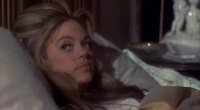















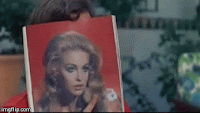









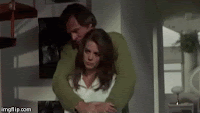





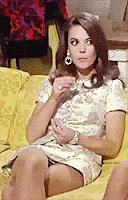
























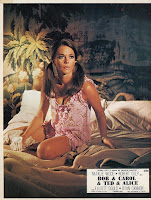




































No comments:
Post a Comment